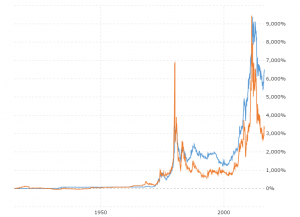Gold and Silver Market Update (1/2/2015) – Golden Eagle
The US economy seems to be on track, recovering steadily from the aftermath of the financial crisis, but there are still some reasons to be wary and one that’s causing a lot of concern is the strong dollar. This is good news for anyone who’s importing, but it’s much less good for US manufacturers trying to sell more abroad. A strong dollar makes imported goods cheaper here, and US ones more expensive abroad. The net result is a flow of cash out of the USA and a healthy boost for foreign manufacturers at the expense of our own. Cheap imported goods also depress inflation, which is already running at barely half the Federal Reserve’s target of 2 percent.
Right now the Fed’s main aim is to get inflation up to the target value, and in an attempt to manage that it’s repeatedly postponed the interest rate rises that most analysts have been predicting for close to a year now. This should have pushed inflation up but so far it doesn’t seem to be working and the strong dollar is likely the main cause of that. Unfortunately for the Fed there isn’t much they can do to resolve the issue because the strength of the dollar against other major currencies, most importantly the Euro and the Yen, is relative not absolute. Some policies can push the dollar down but that won’t help if the Euro is also falling – and it is.
The Euro has rapidly become the world’s #2 reserve currency, which is unfortunate because it was always more of a political project than a viable economic one. By shackling productive economies like Germany to less efficient ones like Greece the Eurozone has built in massive tensions and these have been bubbling near the surface for years. Now it looks like they’re about to erupt again; central bank chairman Mario Draghi wants to implement a program of quantitative easing to boost growth in the Mediterranean fringe but Berlin, who fears having to pay for it all, is digging its heels in. The reality is that the European Central Bank can’t do anything without the approval of the powerful Bundesbank, and that won’t act against German interests. The result is the action needed to rescue
Europe’s weaker economies is being blocked and that’s dragging the currency down. The Euro is now at a four-year low against the dollar, which as a bonus for Berlin makes German goods cheaper abroad. Despite its relatively small size – its population is a quarter the size of the USA’s – Germany is a real export powerhouse, rivalling China for first place and often coming out ahead. A weak Euro benefits German industry at the same time as it hurts ours, so Chancellor Merkel has no interest in shoring up the struggling Euro. That makes it hard for the Fed to bring the dollar to a more realistic exchange rate.
The end result for investors is that if the dollar stays high industrial growth is likely to slow down, and that could put a brake on rising equity prices. Precious metals could benefit there but the better opportunities at least in the short term are likely to be in foreign exchange.








